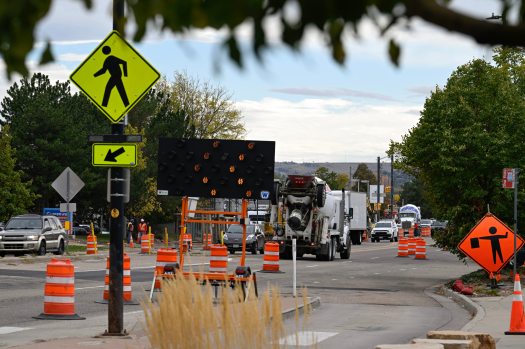UPDATE: The Boulder City Council has just approved a controversial transportation management fee aimed at funding critical infrastructure projects. In a decisive vote of 6-3 on July 20, 2023, council members greenlit a measure expected to generate approximately $6.2 million annually, impacting most privately owned properties across the city.
This fee is seen as essential for addressing Boulder’s unfunded maintenance needs, which amount to around $6.4 million each year, including significant costs for pavement management and bridge upkeep. The urgency of this decision comes as the city grapples with rising infrastructure expenses that will only increase if not addressed promptly.
Among the council members supporting the measure were Ryan Schuchard, Matt Benjamin, Tina Marquis, Nicole Speer, Mayor Pro Tem Lauren Folkerts, and Mayor Aaron Brockett. Opposing voices included council members Mark Wallach, Taishya Adams, and Tara Winer, who raised concerns about the fee’s burden on businesses still recovering from the economic impacts of the COVID-19 pandemic.
The new fee structure specifies that non-residential property owners, including private schools, hospitals, and religious buildings, will be charged between $11 and $160 annually per 1,000 square feet, depending on land use. Single-family residences will face an annual fee of $54, while multi-family residences will pay $42. Notably, the Boulder Valley School District and the University of Colorado Boulder are exempt but may negotiate an agreement with the city for financial contributions.
Despite the passing of the fee, the council’s decision was not without contention. A proposal to delay the ordinance until early next year—potentially allowing for further community outreach—failed by a narrow margin of 5-4. Council members expressed concerns that residents and local businesses have not been adequately consulted about the implications of this new fee.
Council member Wallach articulated his fears regarding insufficient engagement with the business community, stating, “They have not heard of this, they have had no background in this, and I think they have a wider range of concerns.” Similarly, Adams, who voted against the fee, emphasized the potential for increased rent prices impacting residents.
The Boulder Chamber of Commerce expressed resistance to the fee, highlighting the need for a more collaborative approach to funding infrastructure needs without placing undue burdens on local businesses.
“We are urging the City to work more collaboratively on future funding approaches that balance infrastructure needs with serious economic realities local employers face,”
said Jonathan Singer, senior director of policy programs with the chamber.
As Boulder moves forward with implementing this fee, residents and business owners will be closely monitoring the situation, particularly as the fee’s collection is scheduled to begin in mid-2026. The council’s decision underscores the ongoing debate about how best to fund essential city projects while also considering the economic pressures facing the community.
Stay tuned for further updates as this story develops. The council’s next meeting will likely address community feedback and potential adjustments to the implementation process.







